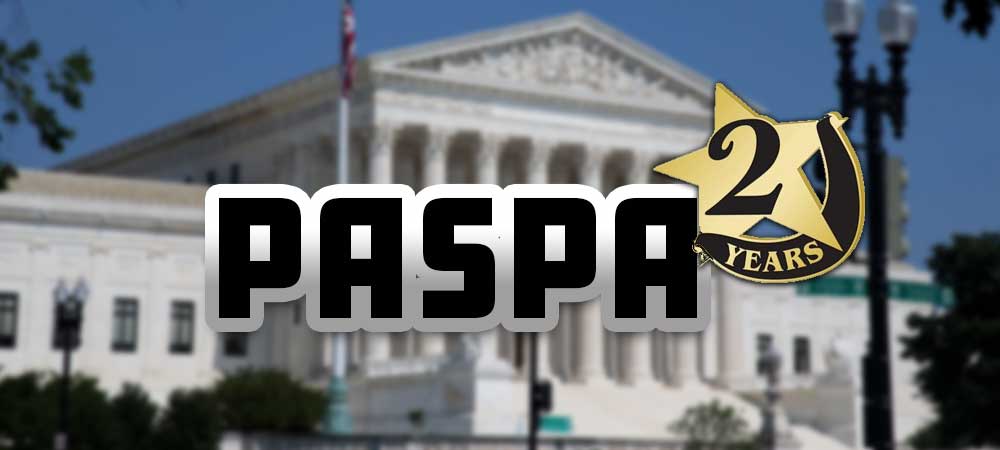- The Supreme Court voted to overturn the Professional and Amateur Sports Protection Act (PASPA) two years ago.
- Since that decision, the popularity of sports betting has exploded in the United States, both in terms of participation and representation in pop culture.
- 23 states now have legalized sports betting, whereas only four did prior to PASPA being overturned.
- New Jersey is emerging as America’s new favorite state for sports betting, largely because of its commitment to online betting.
- There have been a few hiccups along the road to nationwide legalization, but all indications are that the last two years are that the U.S. is still only scratching the surface of its sports betting potential.
WASHINGTON – Exactly two years ago, the U.S. Supreme Court voted 6-3 to overturn the Professional and Amateur Sports Protection Act (PASPA) of 1992, ushering in a new era of legal sports betting in the United States.
Under PASPA, sports betting in the United States was confined to a handful of states with pre-existing laws that were grandfathered into the new system. When it was overturned, every state was free to set its own sports betting laws
Since then, over 20 states have adopted sports betting legislation and state-licensed sportsbooks have become a multi-billion-dollar annual industry.
Sports betting has become so widespread in commonplace that even major sports networks like FOX and ESPN now feature dedicated betting shows like Lock It In and The Daily Wager, respectively.
The sports betting industry has made a seamless transition from being one of the sports world’s greatest taboos to a core piece of its identity. To commemorate the second anniversary of this momentous decision, LegalSportsBetting will take a look back at how far sports betting has come since May 14, 2018.
23 States With Legal Sports Betting
Prior to the decision to overturn PASPA, four states had pre-existing laws that partially or fully exempted them from its prohibitions on sports betting: Nevada, Oregon, Montana, and Delaware.
Two years after the decision, 23 total states have now made legislative changes to legalize sports betting and 18 have fully launched sports betting.
Some of the most recent states to launch include major population hubs like Michigan and Illinois.
Even with the Coronavirus pandemic disrupting life, two states have already managed to pass sports betting legislation in 2020: Washington and Virginia.
While the largest states in the country—Texas and California—remain elusive, the scope of legal sports betting in the United States has expanded greatly over the last 24 months. By the end of the decade, it seems likely that nearly all states will have legal sports betting.
A few states, like Idaho, Utah, and Wisconsin, could have trouble passing sports betting legislation because of clauses in their state Constitution, but for the other 47 states, sports betting is likely inevitable.
New Jersey Becomes A New Sports Betting Leader
Under PASPA, Nevada was reliably collecting several hundred million dollars a year in sports betting revenue, but since it was overturned, New Jersey has surged ahead of Nevada.
Driven largely by the prevalence of mobile betting options in the state, New Jersey handled over $4.5 billion in sports wagers in 2019, and all indications are that it will surpass Nevada in 2020 as the top state in terms of sports betting revenue.
Both states offer mobile sports betting options, but Nevada casinos dictate that players must sign up for an online betting account in person, which has severely hurt its online and mobile betting potential.
New Jersey has done a brilliant job of embracing technology to bolster its sports betting portfolio. This innovative mindset and its stranglehold on the New York City market should lead to New Jersey becoming America’s new favorite sports betting state.
States Miss Projections
While most developments since the overturning of PASPA have been positive, there have been a few hiccups along the way as well. Some of the most notable have been the states that fell woefully short of overly optimistic projections.
Rhode Island, for instance, anticipated revenues of over $45 million during its first full year of legal sports betting but collected only $17.8 million. High tax rates proved to be a deterrent to new companies looking to join the market.
Lawmakers in some states assumed that simply legalizing sports betting was enough to prompt a financial windfall, but in reality, but these missed goals are a good reminder that successful sports betting is a venture that requires cooperation between legislators and sportsbook operators.
Outlook For Year Three And Beyond
Despite the occasional hiccups, the sports betting industry in the United States still appears to be on a meteoric rise.
The Coronavirus will lead to a short-term decrease in handle and revenue in 2020, but once major sports leagues resume play, revenues should once again fall back into a pattern of consistent growth.
Barring any major unforeseen mitigating circumstances, the U.S. sports betting industry should be poised for continued expansion and growth in 2021 and beyond.
Advertising Disclosure
In order to provide you with the best independent sports betting news and content LegalSportsBetting.com may receive a commission from partners when you make a purchase through a link on our site.
News tags: 1992 | Coronavirus | COVID-19 | Delaware | ESPN | Fox | Idaho | Lock It In | Montana | Nevada | New Jersey | New York City | Oklahoma | Oregon | PASPA | Professional and Amateur Sports Protection Act | Rhode Island | Supreme Court | The Daily Wager | Utah | Virginia | Washington | Wisconsin

With a dual background in English and sports performance and business analytics, Carter aims to write stories that both engage and inform the reader. He prides himself on his ability to interweave empirical data and traditional narrative storytelling. When he isn’t keeping readers up to date on the latest sports betting legal news, he’s banging his head against a wall regretting his decision to be a Tampa Bay Buccaneers fan.


 Bitcoin Sports Betting Sites
Bitcoin Sports Betting Sites Best Online Sports Betting
Best Online Sports Betting Famous Sports Bettors
Famous Sports Bettors States With Legal Sports Betting
States With Legal Sports Betting Sports Betting Events
Sports Betting Events




